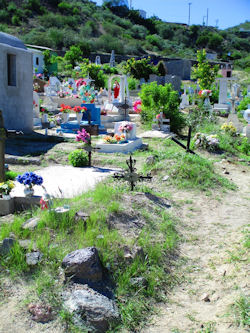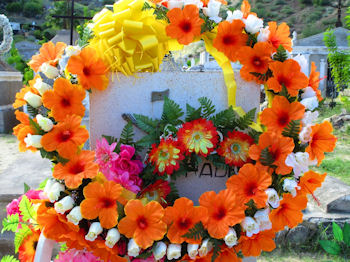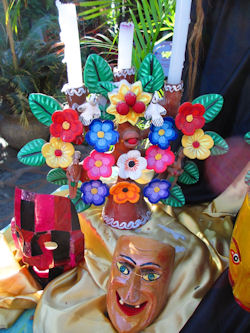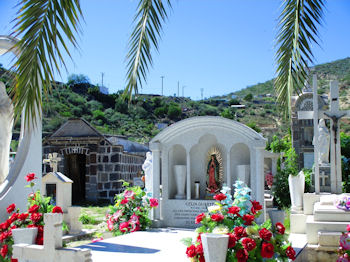 |  |
By Martina

A gentle breeze blows through the cemetery stirring the silken flowers adorning the grave sites of loved ones. Bright sunshine flashes off the white tombs and sacred statuary of Christ and Guadalupe. The cemetery is laid out in a haphazard movement of the history of death with no forethought. Many feet have passed this way on the well worn dirt paths meandering through the grounds. As I walk I realize that the story I set out to write was leading me in a new direction. As a Storyteller there is nothing to do but follow when the story comes alive. It becomes a living expression and is a mystery in itself.
I thought I would be writing about the grand pageantry that is seen in glossy travel magazines of the southwest, where thousands of tourists go each year to enjoy the festivities with blazing candlelight, night fires and Kachina dancers. Huge elaborate altars laden with heavy breads, sweets and tequila are found everywhere in these towns and often there are contests awarding prizes for the most beautiful. But I began to see this Day of the Dead story was going to be very different when I noticed there were very few fresh marigolds as offerings. The Mexican marigolds, cempasúchil, is a Nahuatl word meaning "twenty flowers" and has been thought to attract the souls to the offerings given by the living. However, here in this isolated fishing village of Mulegé, there are no flower shops or nurseries. The locals make up for it, con gusto, in a grand fashion with huge colorful wreaths, vases stuffed full of all the colors one could imagine in silk flowers. I was alone for the moment, stepping carefully into the world where hundreds lay dead. Raven settled down on a rusted cross at the top of a tomb, clacked its beak together and ruffled its feathers. When the cock crowed three times, I must admit I thought the story was having some fun with me.

A few days earlier, Las Casitas in the center of town had created a delightful Ofrenda, the traditional altar looking very much like a combination of Halloween and Day of the Dead. In this village of humble means the altars are built on a much smaller scale in the individual homes as a welcoming gesture for those who have passed on. A popular food is the pan de muerto, bread of the dead, as well as sugar skulls. The skull theme comes from precolumbian past. It has been researched that celebrating death dates back nearly 3,000 years. In the pre-Hispanic era it has been noted that skulls were kept as trophies. They were displayed during ceremonies as a symbol of death and rebirth. Found on many altars is the famous icon of death itself, La Catrina. Her skeletal form is clothed in finery, her dress is cut low, showing us that even good cleavage is lost one day. The great Mexican humor comes out in their art. One example that has always amused me is Catrina walking her skeleton doggie on a leash, both have grins on their skulls faces. La Catrina is a paradoxical symbol of joy in the face of death. She is a reminder that she can come when least expected, so it is wise to live life fully now, not waiting for some distant future that may never arrive.

Children celebrate a form of Halloween called All Hallows Eve on October 31. On this day they invite the angelitos, spirits of dead children, to visit. In Mulegé the children honored one of their teachers who had died this year. They created their altar at the entrance of the school with orange paper garlands. As I continued to walk, I was touched by the simple beauty, the sunlight and the freshness of the day. There were tiny memorials decorated with toys and angels. I was vigilant about where I placed my feet; the path was narrow here. What caused me to pause were small mounds of dirt and stones, bright green grasses sprouted up through the crevices. No headstone or wooden cross eased the mystery of these little ones. Possibly they were amongst the angelitos invited to return to play for their special day.
November 1, the Mulegé village was focused on going to the cemetery to clean and decorate. This is All Saints Day when the adult spirits will come for a visit. The family will tantalize their loved ones with all their favorites and do not hesitate to put out tequila, plentiful beer and great displays of garlands, wreaths and showy florals. November 2 is the last of the three-day fiesta, called All Souls Day. All the spirits are invited and families tell funny tales at the expense of their loved one's memory. Even in grief they can laugh while tears run down their cheeks.
As I make my way back out, I considered the story and what it has to say. This day was not a tourist attraction, but a day for the true traveler that wanders in the search of deeper understanding. I believe the Mexican people give us an opportunity to share in their richness of spirit when it comes to death. We often are so morbidly fearful at the thought of this inevitable event, we lack the spiritual preparation. We will put off what are hearts and spirits want to do for thoughts of a fanciful future. We may forget to tell people how much we love them. The Mexican people show us by example how to live knowing the truth about death, the truth that La Catrina is our companion everyday.
I step out into the unpaved roadway. Children's laughter floats out from the schoolyard near by. Life continues. The story to be told is that under the pageantry of the Day of the Dead celebrations is found a profound message often missed. This day, quiet and humble, transcended tradition. La Catrina grinned and walked with me to my car.
Martina's email: mteomaya(at)gmail.com


The trip was good. Almost needed a tow from a remote area of San Quintin, Baja California. After...

A very easy to use website and good selection and rates. In the 10 years I have travelled in Baja,...

Super easy I just entered my info on line paid $60 for 5 days of coverage and the policy was...